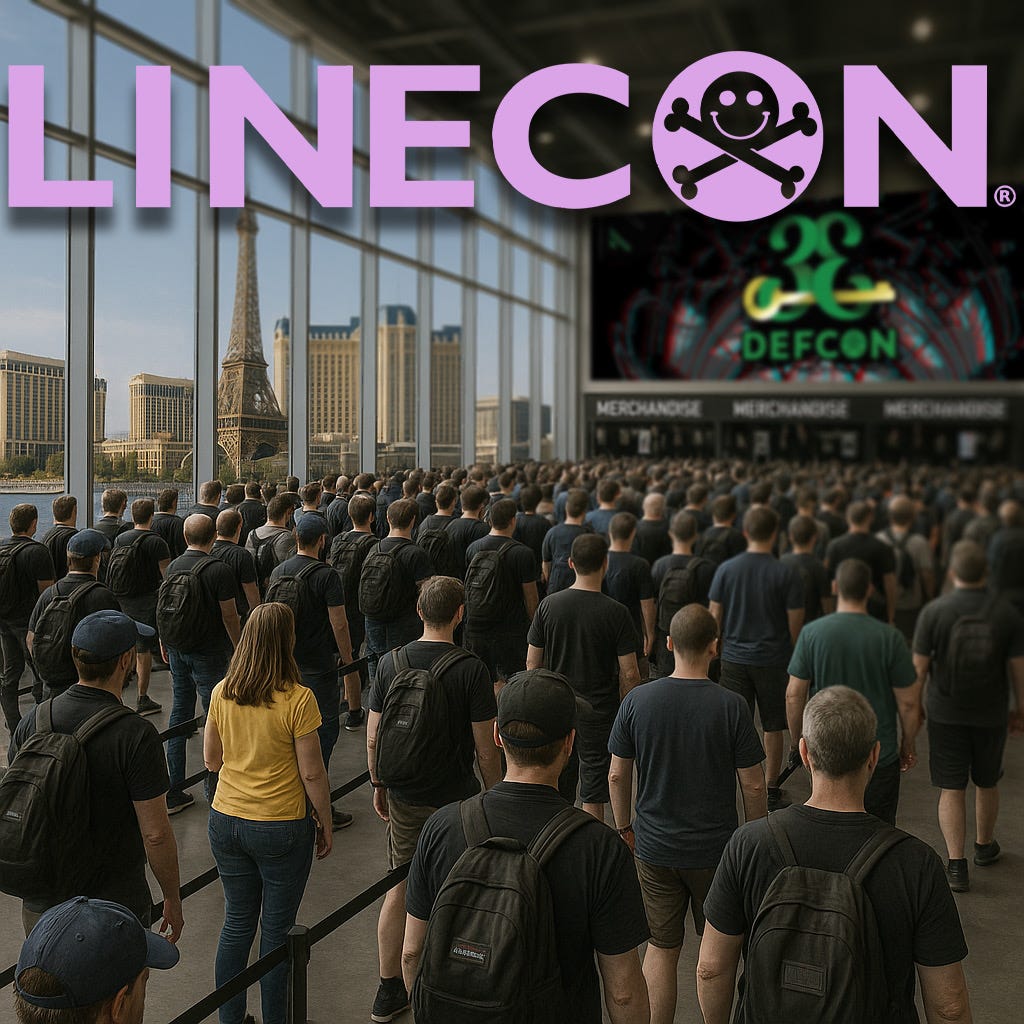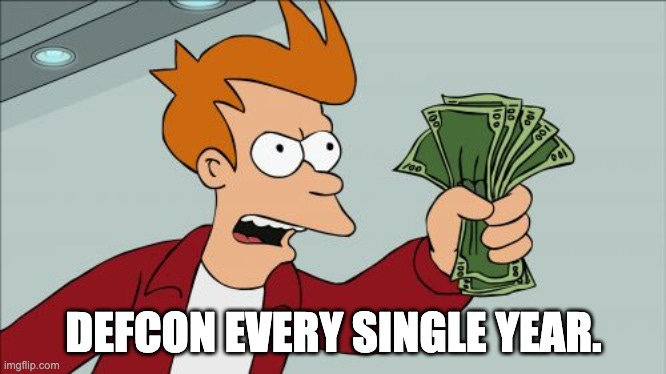My First DEFCON: A Noob’s Chronicle of Chaos, Coffee, and Crypto Stickers
Day One – Line Con and Noob Village
DEFCON. The legendary hacker conference in Las Vegas. A pilgrimage for the cyber-curious, the code-wielding elite, and anyone who enjoys voiding warranties. For first-timers like me, it’s also a patience stress test before you even touch a badge scanner.
Lesson one arrives quickly: Line Con. It’s not on the schedule, but it might as well be its own village. Picture a three-hour wait for limited-edition shirts, stickers, patches, flags, drinkware, and other hacker relics destined to sell out before the ink is dry on your receipt. The line is long, but alliances form, stories are swapped, and you start mentally cataloging which strangers might be useful in the event of a zombie outbreak in the merch hall.
Pro tip: bring cash. The DEFCON merch booth doesn’t take cards, crypto, or “but I’m good for it.”
With my wallet lighter and my Timbuktu bag one stress point away from a warranty claim, I headed to the new Noob Village, a safe haven where asking “stupid” questions won’t get you the side-eye from a DEFCON veteran.
That’s where I met John, a man radiating “Mentor Mode” energy. He broke down the difference between hard and soft skills with surgical precision:
• Soft skills aren’t just technical chops. They’re the leadership, professionalism, attitude, and teamwork that define how you operate. It’s what makes people want to work with you instead of quietly wishing you’d lose Wi-Fi.
• Hard skills are learnable tools: certifications, help desk experience, and the foundational tech skills that get your foot in the door.
Then John delivered what I now call the quote of the con:
“This industry tickles my tism’s because it’s forever changing and adapting. You can’t rely on hard skills alone because the ground shifts too quickly. You can’t just get a CompTIA cert and think you’re set—four months from now it might not even be the standard. And if you’re a jerk, no one will want to work with you.”
A perfect reminder that in cybersecurity, adaptability is king and you can’t un-jerk a person.
Later that day, after taming the Hacker Tracker app (mandatory for survival), I navigated the sprawl of the convention center like I actually belonged there. My first stop was the Blue Team Village, the defenders of the digital realm. Incident responders, threat hunters, and SOC warriors traded stickers like rare crypto coins. Day One may be light on events, but that’s an advantage. It’s prime time to map the terrain, bookmark talks, and prepare for the three-day storm ahead.
Days Two and Three – Knowledge, Hardware, and Pizza
With the vendor and conference floors in full swing, DEFCON splits into two distinct worlds. One side is pure knowledge: talks, villages, and hands-on labs that sharpen technical edges. The other is a bazaar of temptation I mentally labeled “where to buy fancy things” and pizza.
The Lock Picking Village was a constant chorus of clicks as people popped locks like they were resealable snack bags. The Bio-Lab Village felt like a cross between a high school science fair and a covert CIA program. Nearby, CTF competitors hunted virtual flags while others raced the clock to defuse a simulated bomb in under ten minutes. You could dive in yourself or just watch the pros work like it was a high-stakes esports final.
The vendor area was its own universe. One aisle offered cutting-edge hacking hardware, another was stacked with books that could make you an expert or at least let you sound like one at parties. The badge displays showcased years of DEFCON history in blinking, soldered glory. Naturally, I collected more free stickers than any responsible adult needs before finally succumbing to temptation and buying my first Flipper Zero. Call it an impulse purchase. Call it a professional investment. Both would be correct.
Panels, Purple Teams, and Legally Breaking Into Buildings
A standout was a THOR panel on the symbiotic relationship between red and blue teams, and how that interplay gave rise to the purple team—a hybrid force blending offense and defense. These are the talks you do not skip, which is why mastering the Hacker Tracker early is critical. Other sessions delivered equally fascinating deep dives, from securing bio-lab equipment to the art (and legal framework) of physical penetration testing—yes, it’s a thing, and yes, it involves picking locks and bypassing security systems with permission.
Friday – Networking, Beats, and Hacker Jeopardy
Friday was my “people and panels” day. I hit every session I’d bookmarked on day one and made valuable networking connections. I also executed a surgical strike on the food court—only to discover Dunkin’ Donuts sells out by lunchtime.
That afternoon, I traded my attendee badge for the stage and performed live as Elipscion, an industrial, AI-driven machine fused with the human mind. For an hour, the room pulsed with relentless beats, before giving way to other jaw-dropping performances that kept the energy alive deep into the night.
Then came Hacker Jeopardy—an event nothing could have prepared me for. Imagine drunken hackers and DEFCON goons locked in mortal trivia combat for bragging rights, while losers are briskly escorted off stage for “f***ing it up.” Categories ranged from deeply technical to absurd inside jokes, and the crowd’s energy was pure DEFCON—chaotic, brilliant, and absolutely unforgettable.
Saturday and Sunday – High Noons, High Scores, and High Spirits
By the weekend, the days blurred into a digital haze powered by High Noons, caffeine, and relentless laughter. Capture the Flag competitions were still raging, but now the victories were becoming clear. In the Social Engineering Village, borderline DEFCON celebrities emerged victorious, dismantling targets with nothing more than a phone call and unsettling charisma. Across the floor, CTF champions quietly stacked bragging rights that would last until next year.
In between events, I met remarkable people who proved that hacking isn’t just about breaking things—it’s about protecting others. There was 0Day, the ethical hacker leading high-impact missions against digital child exploitation. Talking Sasquatch, a YouTube tech influencer whose presence drew eager crowds. And my personal highlight—meeting Jack Rhysider of Darknet Diaries. Not only did he take the time to chat, he gave me one of his bracelets, now a permanent part of my DEFCON memorabilia.
Final Thoughts – Leaving Las Vegas with Stickers and Stories
Walking out of DEFCON on Sunday felt like stepping back from a parallel universe—one where time is measured in CTF rounds, meals are optional, and you’re never more than six feet away from someone who can breach a firewall faster than you can open a bag of Skittles. What began with a three-hour merch line ended with a head full of knowledge, a bag full of gear and stickers, and a contact list stacked with people I’d be lucky to work with in the future.
For all its chaos, DEFCON isn’t just a hacker playground—it’s a community. It’s where offensive and defensive minds trade ideas over coffee (or beer), where new tech meets old tricks, and where you’re reminded that the most valuable skill in cybersecurity isn’t a cert or a zero-day—it’s the ability to adapt, collaborate, and stay curious.
I arrived as a noob. I left with sore feet, sleep-deprived, and a little poorer, but with new skills, new friends, and a deeper respect for the fiercely protective, wildly creative culture that keeps this digital world spinning. Until next year, DEFCON. Hack the Planet.
My Personal List: Going from Noob to w00
Bring cash. The official DEFCON merch booth only takes paper money. Cards, crypto, and IOUs will get you a smile and a “next, please.”
Wear good shoes. Trench coats and 18-eye boots may complete your cyberpunk aesthetic, but 9,000 steps a day will humble you. By day two, your feet will feel like they’ve been in a brute-force attack. (Especially if walking at Sydney's pace)
Pick a hotel that’s central and near the monorail. Vegas taxis will run you about $20 each way. The monorail? Thirty bucks for four days of unlimited rides. That’s money you can spend on hardware or questionable food choices instead.
Introvert → Extrovert. DEFCON is a networking jackpot. Your next boss, business partner, or partner-in-crime could be standing next to you in line. Skills matter, but if people know they can work with you without wanting to strangle you, you’re already ahead.
Hydrate. Yes, really. Vegas in August averages 108°. This is not the place to test your body’s limits on zero water. Keep a bottle on you at all times unless you enjoy the taste of hospital air conditioning.
Do something new. Don’t spend your entire trip trapped inside the con. Hacker Tracker lists social groups that head out for food and fun. Networking doesn’t just happen over servers and switches—it happens over tacos, ramen, and “I can’t believe I ate that” moments.
Master Hacker Tracker early. Bookmark the talks and villages you want. This is your DEFCON GPS—without it, you’re just another lost packet in a sea of 30,000 people.
Respect the Goons. They are not “just helpers.” They are the demigods of DEFCON. Treat them well, and they will save you more times than any fairy in Zelda.
Have fun. Nobody likes a fuddie-duddie. This community is full of people who could become your next work bestie… or could DDoS you into a digital void. They have the means, they have the knowledge—so maybe buy them a drink and enjoy yourself.
Ten. I just like even numbers.






